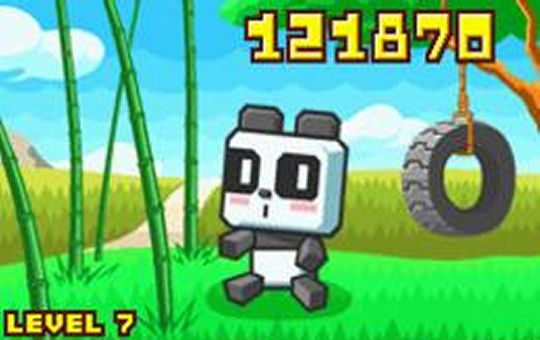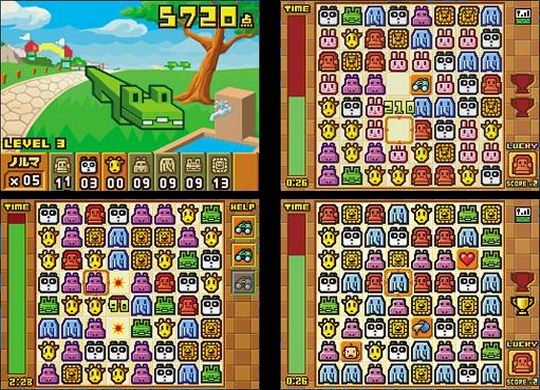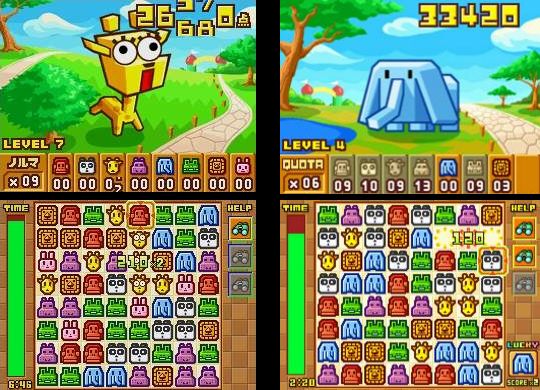|
TAKE A LOOK AROUND
And tell me what you see.
It's really, really easy to review videogames badly, comrades. Any balloon-faced idiot can do it. Play the game for a couple of hours, make some factual observations (NB these two steps can be
skipped if you work for Official Xbox Magazine), then say that you like it. (Or, more rarely, that you don't like it.) There you go, game reviewed, job done. This is by far the quickest - and therefore, cheapest - method of performing the task, so it's the one adopted by the vast majority of reviewers in print today. Unfortunately, it's also a monstrously inadequate one, which tramples all over the entire purpose of having reviews in the first place. Case in point? Zoo Keeper on the Nintendo DS.

"What? You... don't like... Zoo Keeper? Surely that can't be right. I'll read on."
Alert viewers will recall an earlier WoS feature on the cut-down Flash version of this game which runs on the PC. (If you don't, nip off there now and get up to speed. We'll wait.) After a bit of a delay, your reporter got his hands on the full DS version of the game, and loved it. The graphics are even sweeter than the Flash game, the music better, and the touch-screen control is an absolute joy, all but eliminating the physical interface between brain and game entirely and moving the onscreen objects by pure mind-power. And of course, instead of the single game mode of the Flash version, you get four different single-player games to keep you interested as well as some wireless two-player antics. All good so far, right? It's a shame, then, that one of those modes is so stupendously, carelessly awful that it manages to more or less ruin the entire game single-handed. Step up to the spotlight, Quest Mode. Let's have a look at you.
Quest Mode is the third of Zoo Keeper's four main play modes. Unlike the other three modes, where the object is simply to make as many lines of animals as possible, Quest mode features 10 mini-games where you have to perform specific tasks. In the first one, for example, you have to make lines solely of lions, with lines of any other creature bringing a penalty and reducing your score. In another, you have to make exactly one line of every type of animal - make two lines of any particular creature before you've got all seven, and all the lines you've got so far are wiped out.
Those experienced in the ways of Zoo Keeper (either version) will have spotted a potential flaw at this point. "What," they'll be wondering, "happens if you make a line, and the replacement blocks the game drops into the grid, entirely outwith your control, make another line of the wrong type of animals and screw everything up for you?"

Every Quest Mode minigame is affected by the random factor (not pictured).
Luckily, Quest Mode is ahead of you in this respect. Since that would clearly be ridiculously unfair, it makes sure that the blocks it drops into the grid aren't ones that would cause that to happen. In such a way, it ensures that the game remains a test of skill, rather than a completely pointless random dice-rolling exercise.
Oh no, wait. It doesn't.
That's right, chums. In every one of Quest Mode's ten mini-games, you're entirely in the hands of fate. The game will quite happily serve you up a grid of animals which is completely impossible to clear in the manner ordered, in which no matter what you do, the game will toss in a bomb that wrecks all your progress and sends you back to square one. And then, to add injury to insult, it'll call you an idiot and dock you a huge chunk of points for failing. Not just from your score for that mini-game, but for your entire quest to that point. Yep, that's right - if you've performed miracles in the first seven mini-games, say, and built up a decent score, but then been dumped on with an impossible grid in Game Eight, the game will dock you up to 70% of the total points you've gathered from all eight games.
What's more, the amount it docks you for
failure seems - like the amount it awards you if you succeed - to be
substantially random. You can take 40 moves to clear a level and be
docked 70% of your points, or take 200 moves and only be docked 30%.
Ten minutes of play can thus be - and usually are - utterly
destroyed by something you had absolutely no way of influencing. The
entire mode may as well be replaced by a button that you press that generates a random number of points,
but takes five minutes to do it.
But, y'know, so what? So Quest Mode is rubbish? Then you just don't play it, right? Stick to the other three modes and have fun! Sorry, chums, wrong again.

Can alert viewers spot all the differences between these two pictures? Touch the screen!
Because the thing that's so awful about
Zoo Keeper isn't just that Quest Mode was designed and implemented
by a useless cretin. The thing that's so awful is that, having
gouged such a hideous scar into the face of an otherwise-beautiful
game, some spectacular fucking moron decided to weave every other
mode in the game inextricably into the abysmal Quest Mode as well.
How so? Like this:
Zoo Keeper is a high-score game. It isn't about "completing" anything, it's about scoring points, and hence competing against yourself and your friends and the rest of the world to get the best score. But there's a curious feature built into the game, whereby you score much more for playing the game at the higher difficulty settings. To get anywhere near the best scores, you have to play at the "Super Hard" setting, which isn't available at the start of the game and has to be unlocked. And how do you unlock Super Hard difficulty? By getting the top score on the game's preset high-score tables for each of the four modes.
Including Quest Mode.
That's right, viewers. In order to compete properly with anyone else in any of Zoo Keeper's modes (because it doesn't keep separate score tables for different difficulty settings), you HAVE to first play the entirely random, entirely unfair Quest Mode until you top its high-score table. Now, since it IS entirely random, you might get lucky, of course, and achieve that on your first go. Or, since it's entirely random, you might repeatedly work your way up to the required total, only to have the game cheat you in the eighth or ninth or tenth minigame and steal all your points. And, since it's entirely random, you might NEVER achieve the requisite score, and hence never be able to compete with the rest of the world at any of Zoo Keeper's other, mostly wonderful, modes.
(NB Your reporter takes this opportunity to record that, after two days of gruelling misery, he eventually DID top the Quest Mode table, and so this isn't sour grapes.)
Zoo Keeper's Quest Mode is one of the most brainlessly moronic acts of wanton vandalism perpetrated on an otherwise-glorious videogame that this reviewer's ever had the misfortune of witnessing in 16 years of reviewing. It absolutely beggars belief that the game was allowed to go out in this condition, but it's yet another symptom of the disintegration of the quality-control policy that was once one of Nintendo's defining characteristics. (Your reporter may expand on how the same debilitating, stupid carelessness also spoils other DS launch titles like Polarium
at some point in the near future.)
If you're lucky, and don't get sabotaged by Quest Mode, Zoo Keeper is a completely brilliant game - there are a couple of other minor flaws in it related to the pacing of the first two modes, but nothing big, and Time Attack mode in particular is a life thief which will swallow endless hours of your time in highly addictive amusement. If you're randomly unlucky, however, the whole game will be either a frustrating, infuriating waste of time (if you try to unlock Super Hard mode), or a hollow, pointless one (if you give up and play only to beat your own scores). Why not spend 30 quid of your money rolling the dice to find out, eh?
|

